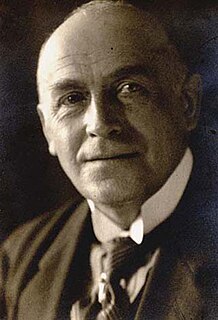Peter Urban Gad was a Danish film director. He directed 40 film between 1910 and 1927. His wife Asta Nielsen starred in 30 of his films, also in his début the famous film Afgrunden from 1910. They moved to Germany in 1911 where Gad worked with Paul Davidson until 1922.

Gösta Berling's Saga is the debut novel of Swedish author Selma Lagerlöf, published in 1891. It was made into a 1924 silent film directed by Mauritz Stiller starring Greta Garbo, Lars Hanson and Gerda Lundequist. A 1925 opera I cavalieri di Ekebù by Riccardo Zandonai was also based on it.

Frans Gösta Viktor Ekman was a Swedish actor. Generally spoken of as Swedish theatre's most legendary stage actor, Gösta Ekman enjoyed a prolific stage career during his short life, becoming the first real star of Swedish theatre. His boyish good looks attracted both sexes, helping to create a massive cult following and elevating him to the status of a living legend. Combined with a beautiful voice and a powerful stage presence, Ekman was able to captivate his audiences.
Svend is a Danish and Norwegian given name that may refer to:

August Blom was a Danish film director, production leader and pioneer of silent films during the "golden age" of Danish filmmaking from 1910 to 1914.

Olaf Fønss was a Danish actor, director, producer, film censor and one of Denmark and Germany's biggest stars of the silent film era.
Axel Graatkjær (1885–1969) was a Danish cinematographer noted for his work on silent films during the Golden Age of Danish cinema. Graatkjær was the favorite cinematographer of film director August Blom as well as silent film star Asta Nielsen and her husband, director Urban Gad. He filmed more than 100 films during his career from 1906 to 1930.

Osvald Helmuth was a Danish stage and film actor and revue singer.
Svend Bille was a Danish stage and film actor.
Anders Wilhelm Sandberg was a Danish film director and screenwriter.
Gudmund Nyeland Brandt was a Danish landscape architect who was internationally renowned.

Viggo Lindstrøm was a Danish actor and theatre director, founder of Det Ny Teater in Copenhagen. He was married to the actress Vera Lindstrøm.
Johan Valdemar Ankerstjerne was a Danish cinematographer who for many years was head of cinematography at Nordisk Film. He was reportedly the best cameraman in Denmark in the 1910s, making many films for August Bloom from 1911 until 1916 and then for Benjamin Christensen. He created the unique "images of Haxan". In 1932 he founded Denmark's first film laboratory, Johan Ankerstjerne A/S which, after merging with Nordisk Film Teknik, became the largest production facility in the country.
Hans Egede Budtz was a Danish stage and film actor.

Astrid Holm was a Danish theater and film actress whose career began on the stage and in the early silent film era.

Svend Melsing was a Danish stage and film actor, theatre director and playwright whose career spanned nearly forty years.

Gudrun Houlberg (1889–1940) was a Danish actress who appeared in over 40 films from 1910 to 1934. She is remembered in particular for her roles in Klovnen (1917) and Grevindens ære (1919).
Paula Marie Mathilde Illemann Feder was a Danish actor and educator.

Estrid Hein née Hansen (1873–1956) was a Danish ophthalmologist, women's rights activist and pacifist. She practised in Copenhagen from 1898, opening her own clinic in 1906. She was also a prominent figure in the women's movement, chairing the Copenhagen chapter of the Danish Women's Society from 1909, later serving on the society's central board. In 1915, she became an active member of Danske Kvinders Fredskæde (DKF), the Danish arm of the Women's International League for Peace and Freedom. The same year she joined the Scandinavian Family Law Commission where she was effective in furthering progress on women rights as spouses. From 1933 she participated on the executive board of Denmark's Women's Council.
















